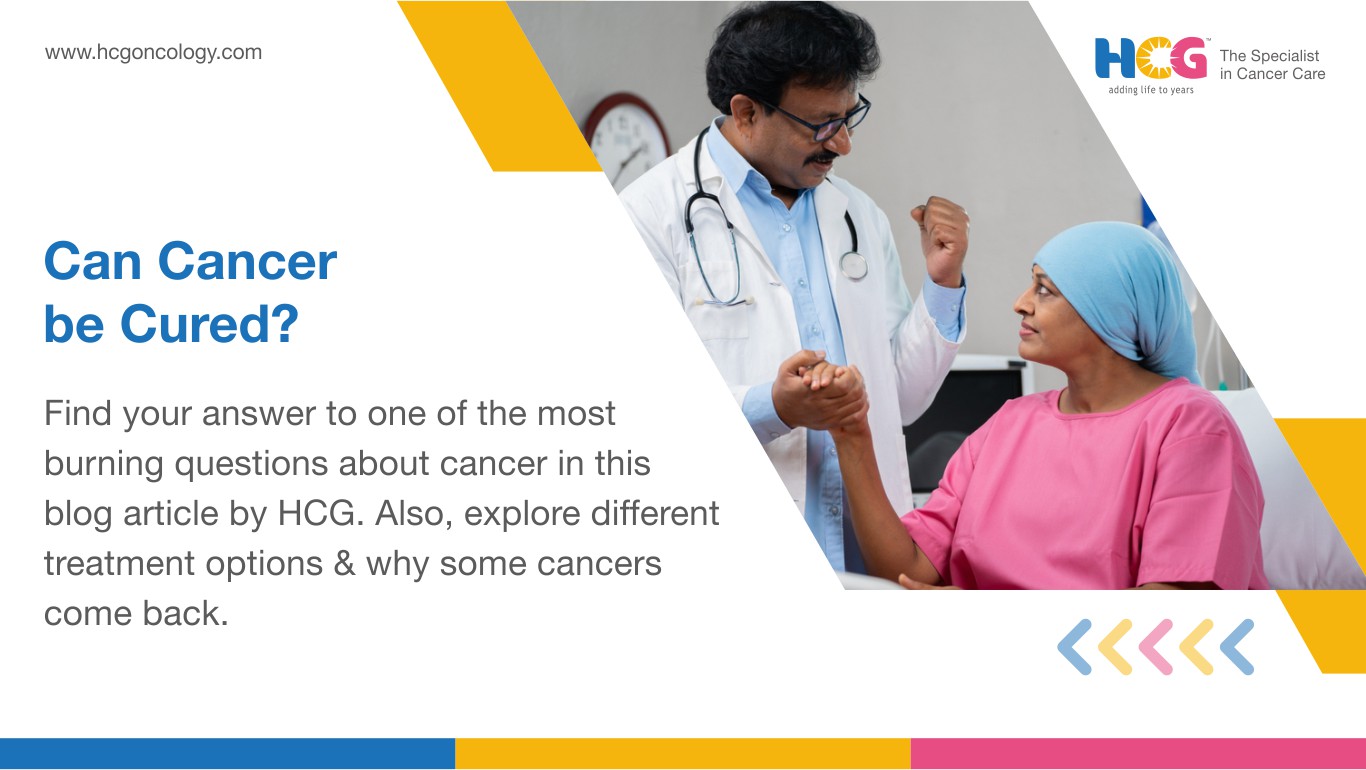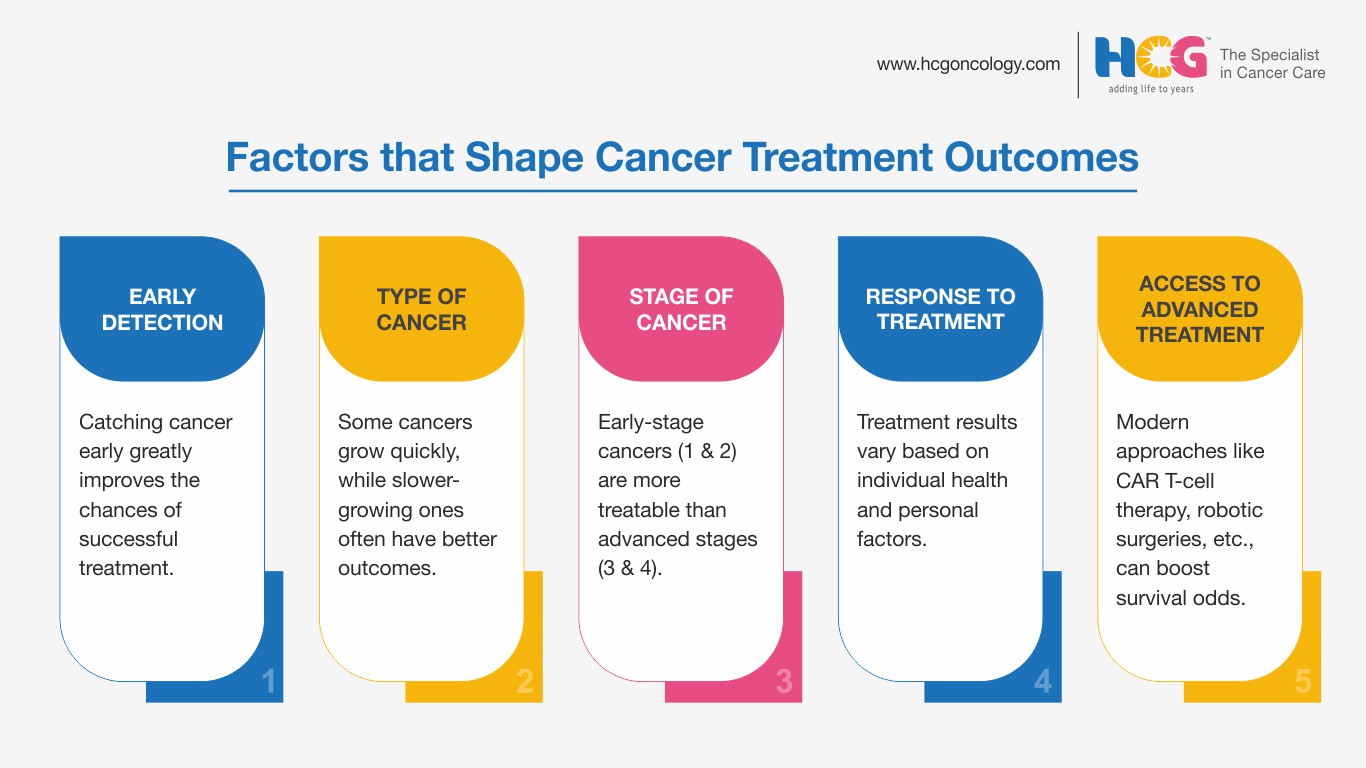
22 Dec, 2025
Feel free to reach out to us.

22 Dec, 2025

This article is medically reviewed by Dr. Roshni Dasgupta, Consultant - Medical Oncology, HCG Cancer Centre, Bengaluru.
“Can cancer be cured?”
It is a million-dollar question with an ambiguous answer.
However, there is no single answer to this question because each cancer is different, and so is each case and each patient.
The health outcomes for cancer depend on multiple factors: the type of cancer, its stage, and the individual's response to treatment.
This article discusses various aspects of cancer, such as the importance of early detection, differences between treatment goals, various treatment approaches available for cancer, factors that control the treatment outcomes, and more.
It is a group of diseases characterized by the uncontrolled growth and spread of abnormal cells, which occurs when there is an undesirable mutation in a cell’s DNA structure.
If not controlled, it can invade nearby tissues and organs, leading to severe health complications, including death.
There are more than 100 types of cancer, such as breast, lung, colon, and blood cancers, that can develop in any part of the body.
The survival statistics give a rough idea of the chance that someone will survive a specific type of cancer for a certain period.
It should be noted that these figures are only an average estimate from studying many cases and may not reflect an individual’s prognosis.
Survival rates vary depending on the cancer diagnosis, the type of cancer, its stage, grade, and how well it responds to treatment.
Surgery involves removing the tumor, often as a first-line treatment for localized cancers. It may also involve the partial or complete removal of the affected organ, which may or may not be followed by reconstruction surgery.
Powerful radiation is applied to kill cancer cells or reduce tumors. Radiation therapy may be administered independently or in combination with other therapies for better outcomes.
Chemotherapy refers to the administration of powerful anti-cancer drugs to destroy cancerous cells. Doctors recommend chemotherapy to patients before an operation so that their tumors become smaller, after an operation to destroy any cancer cells left behind, or when surgery cannot be done.
Immunotherapy enhances the body’s natural defense against cancer. It involves the use of checkpoint inhibitors and monoclonal antibodies to strengthen the immune system so that it can fight against cancer cells.
Targeted therapy concentrates on particular genes or proteins in cancerous cells that facilitate their multiplication. Its approach to targeting cancer cells is more precise than chemotherapy.
Some types of cancer, including breast and prostate cancers, depend on hormones for their growth. To retard the development of cancer, hormone therapy obstructs or decreases hormone secretion.
Robotic surgery is a novel cancer surgery approach wherein a surgical robot performs the surgery with tiny incisions. The robotic arms attached to this platform carry various surgical instruments and a camera source, which helps the surgeon precisely target the tumor and operate on it.
This approach benefits patients with reduced blood loss and pain, fewer treatment-related complications, faster recovery, and a better quality of life.
Adaptive radiotherapy is a modern approach to radiation therapy in which advanced imaging and artificial intelligence (AI) are brought together to continuously adapt the radiation delivery to changes in tumor position caused by breathing, tumor shrinking, weight loss, tissue swelling, and organ reduction.
Adaptive radiotherapy plays a significant role in precise tumor targeting and reducing damage to healthy tissues.
CAR T-cell therapy is an innovative way of treating cancer. During this treatment, the patient’s T-cells are engineered to identify and destroy cancer cells more effectively. This cancer treatment is found to be highly effective in patients suffering from hematological malignancies such as leukemia and lymphoma, especially those that are recurrent or refractory (not responding to conventional treatments).
Artificial intelligence and machine learning are being extensively used in the healthcare sector.
Lately, researchers have exclusively studied the role of AI in cancer screening, diagnosis, treatment, and prognosis prediction, and it has been found that AI helps in more accurate diagnostics and better decision-making while planning the treatment.
Some cancers have better outcomes than others, and this is because treatment outcomes are decided by a myriad of factors.

Even after successful cancer treatment, some cancers return or recur. Follow-up care and surveillance play a pivotal role in early detection and effective management if a recurrence should occur.
Even if the visible tumor is removed, microscopic cancer cells may remain and cause tumor growth later (micrometastasis). Rarely, the surgery itself may cause the cancer cells to dislodge, which can later travel to different parts of the body and form tumors.
If the cancer is operated on in advanced stages, there are chances of cancer remaining in the body, which can spread to other parts of the body.
In some cases, radiation therapy may not kill all cancer cells, and these cells multiply later to form tumors. In rare cases, when the disease metastasizes to other body parts during or after the treatment, cancer may come back after radiation therapy.
Early cancer diagnosis is crucial for effective cancer management. For some cancers, there are standard screening protocols that aid in their early detection.
A few commonly recommended screening tests include mammograms for breast cancer, Pap smears for cervical cancer, colonoscopies for colon cancer, and PSA tests for prostate cancer.
Regular health checkups and cancer screening can aid in early detection, which prompts timely treatment. On-time treatments are in turn important for better survival rates and improved quality of life during and after the treatment.
HCG is a leading cancer treatment hospital in India, and we are known for modern diagnostic and treatment facilities, along with novel treatment approaches:
To address the question, "Can cancer be cured?" it is important to note that many types of cancer are highly treatable. Advancements in early cancer diagnosis, personalized medicine, and new cancer treatments have greatly increased the chances of survival for different types of cancer in recent times. For better health outcomes, everyone needs to be aware of different cancer symptoms and the importance of timely detection and seek medical attention as and when required.

Dr. Roshni Dasgupta
Consultant - Medical Oncology
MBBS, MD (General Medicine), DM (Medical Oncology), MRCP UK, MRCP SCE in Medical Oncology, ESMO Certification
Dr. Roshni Dasgupta is a distinguished medical oncologist with over a decade of experience in managing a wide range of cancers through systemic therapies. She is available for consultations at HCG Cancer Centre, a leading cancer hospital in Bengaluru. Her educational credentials include an MBBS degree from IMPGM&R (Kolkata), an MD in general medicine from NRSMCH (Kolkata), and a DM in medical oncology from BJMCH GCRI (Ahmedabad). Additionally, Dr. Roshni has completed her MRCP UK diploma and MRCP SCE in Medical Oncology, along with ESMO certification.
Appointment Link: Book an Appointment with Dr. Roshni Dasgupta.